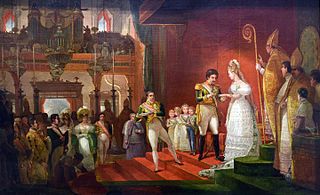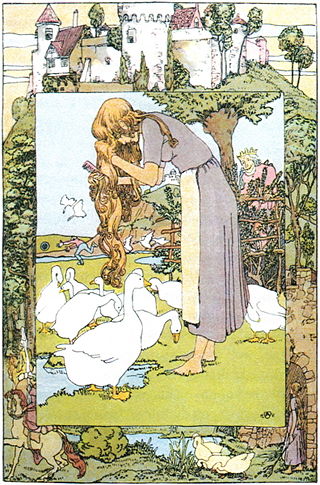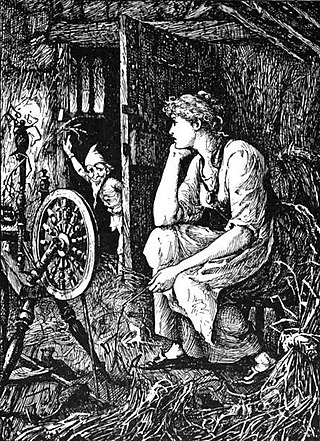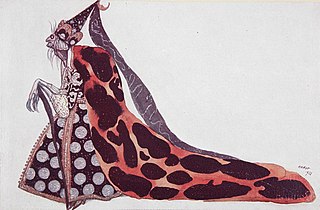
"Cinderella", or "The Little Glass Slipper", is a folk tale with 69 variants that are told throughout the world. The protagonist is a young girl living in forsaken circumstances who is suddenly blessed by remarkable fortune, with her ascension to the throne via marriage. The story of Rhodopis, recounted by the Greek geographer Strabo sometime between 7 BC and AD 23, about a Greek slave girl who marries the king of Egypt, is usually considered to be the earliest known variant of the Cinderella story.

"Sleeping Beauty", also titled in English as The Sleeping Beauty in the Woods, is a fairy tale about a princess cursed by an evil fairy to sleep for a hundred years before being awakened by a handsome prince. A good fairy, knowing the princess would be frightened if alone when she wakes, uses her wand to put every living person and animal in the palace and forest asleep, to awaken when the princess does.

A stepmother, stepmum or stepmom is a female non-biological parent married to one's preexisting parent. Children from her spouse's previous unions are known as her stepchildren. A stepmother-in-law is a stepmother of one's spouse.

"Beauty and the Beast" is a fairy-tale written by French novelist Gabrielle-Suzanne Barbot de Villeneuve and published in 1740 in La Jeune Américaine et les contes marins.

"The Goose Girl" is a German fairy tale collected by the Brothers Grimm and first published in Grimm's Fairy Tales in 1815. It is of Aarne-Thompson type 533.

"The Black Bull of Norroway" is a fairy tale from Scotland. A version titled "The Black Bull of Norroway" in the 1870 edition of Popular Rhymes of Scotland was reprinted in an Anglicised version by Joseph Jacobs in his 1894 book More English Fairy Tales.

"Allerleirauh" is a fairy tale recorded by the Brothers Grimm. Since the second edition published in 1819, it has been recorded as Tale no. 65. Andrew Lang included it in The Green Fairy Book.

The Langs' Fairy Books are a series of 25 collections of true and fictional stories for children published between 1889 and 1913 by Andrew Lang and his wife, Leonora Blanche Alleyne. The best known books of the series are the 12 collections of fairy tales also known as Andrew Lang's "Coloured" Fairy Books or Andrew Lang's Fairy Books of Many Colors. In all, the volumes feature 798 stories, besides the 153 poems in The Blue Poetry Book.

"Katie Woodencloak" or "Kari Woodengown" is a Norwegian fairy tale collected by Peter Christen Asbjørnsen and Jørgen Moe in Norske Folkeeventyr. Andrew Lang included it in The Red Fairy Book.

"Donkeyskin" is a French literary fairytale written in verse by Charles Perrault. It was first published in 1695 in a small volume and republished in 1697 in Perrault's Histoires ou contes du temps passé. Andrew Lang included it, somewhat euphemized, in The Grey Fairy Book. It is classed among folktales of Aarne-Thompson type 510B, unnatural love.

The Wicked fairy is the antagonist of Sleeping Beauty. In some adaptations, she is known as Carabosse. The most notable adaptation of the character is Maleficent, a Disney villain who appeared in various Disney media, beginning with the 1959 Walt Disney film Sleeping Beauty.

Cinderella is a ballet-féerie in three acts, with the choreography of Enrico Cecchetti and Lev Ivanov supervised by Marius Petipa. Music is by Baron Boris Fitinhoff-Schell; the libretto is by Lidia Pashkova and Ivan Vsevolozhsky. It was first presented by the Imperial Ballet on 17 December [O.S. 5 December] 1893 at the Imperial Mariinsky Theatre in St. Petersburg, Russian Empire.

The Ordinary Princess is a children's novel written and illustrated by M. M. Kaye. It concerns Princess Amethyst Alexandra Augusta Araminta Adelaide Aurelia Anne of Phantasmorania—Amy for short—who has been given the "gift" of ordinariness.

The Land of Stories is a series of children's fiction, adventure, and fantasy books written by American author, actor, and singer Chris Colfer. The first book, The Wishing Spell, was released on July 17, 2012, with the sixth and final book published in July 2017. Colfer started plans for a prequel series in 2016, and has since published three books in this series, beginning with A Tale of Magic... in 2019.
Evelyn Sharp's short story "The Wonderful Toymaker" is part of a collection of fairy tales in the book, All the Way to Fairyland: Fairy Stories. The Cambridge University Press originally published the anthology in 1897. An EBook version was made available through The Project Gutenberg on 3 November 2009.

"Somebody Else's Prince" belongs to a collection of short stories, named The Other Side of the Sun, written by Evelyn Sharp (1869–1955) in 1900. Other stories in this collection include: The Weird Witch of the Willowherb, The Magician's Tea-Party, The Hundredth Princess, The Tears of Princess Prunella, The Palace on the Floor, The Lady Daffodilia, and The Kite That Went to the Moon.
"The Necklace of Princess Fiorimonde" is a fairy tale written by Mary De Morgan (1850–1907) in her collection of short stories called "The Necklace of Princess Fiorimonde and Other Stories." This collection of fairy tales originally published in 1880. Mary de Morgan helped to make the Victorian era prominent in literature. In her short stories, she is able to use "mystery, pathos, and comedy" to create entertaining and imaginative literature for all to enjoy. In addition, de Morgan uses both female and male protagonists in her writing exhibiting her belief in equality among the sexes. In many of her works, Mary de Morgan uses elements from the folk tales of medieval England. This is apparent in the universality of her literature, as it was easily relatable to all in Victorian England despite the different socioeconomic classes.

"The Tears of Princess Prunella" is a short story belonging to the collection The Other Side of the Sun, written by Evelyn Sharp. Other stories included in this collection are The Weird Witch of the Willowherb, Somebody Else's Prince, The Lady Daffodilia, The Palace on the Floor and The Kite That Went to the Moon.

"The Professor of Practical Jokes" is a literary fairy tale published in 1898 by British suffragist and author Evelyn Sharp (1829–1955). The story tells of a good yet boring king who is tricked into marrying one of his courtiers daughters, who brings excitement into his dull kingdom. The story is one of many published in Sharp's collection, All The Way To Fairyland: Fairy Stories.

"The Doll That Came Straight From Fairyland" is a short story for children published in 1898 by the suffragist and children's fairytale writer Evelyn Sharp. The first edition was published by John Lane in London, England, in All The Way To Fairyland with seven other short stories.

















